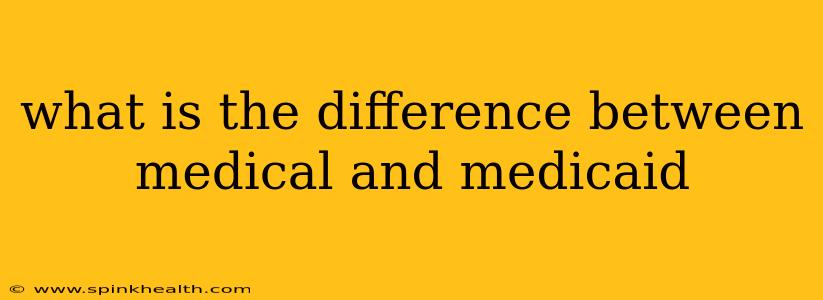What's the Difference Between Medicare and Medicaid? A Tale of Two Programs
Imagine two friends, both needing help navigating the complex world of healthcare. One is a retiree, comfortably living on their savings, but worried about the rising costs of medical care. The other is a single mother working hard but struggling to afford even basic healthcare for her children. These friends need different solutions, and that's where Medicare and Medicaid come in. They're both government healthcare programs, but they serve very different populations and have vastly different structures.
Let's delve into the distinctions between these two vital programs, clarifying their purpose and eligibility criteria.
Medicare: Healthcare for Seniors and Some Disabled Individuals
Medicare is a federal health insurance program primarily for people 65 and older, but it also covers certain younger people with disabilities and those with End-Stage Renal Disease (ESRD). Think of it as a retirement gift – a safety net to help cover the potentially staggering costs of healthcare as we age.
How it Works: Medicare isn't a single program; it's actually a collection of parts, each covering different aspects of care:
- Part A (Hospital Insurance): Primarily covers inpatient hospital stays, skilled nursing facilities, hospice, and some home healthcare. Many people don't pay a premium for Part A because they or their spouse paid Medicare taxes while working.
- Part B (Medical Insurance): Covers doctor visits, outpatient care, some preventative services, and durable medical equipment. Most people pay a monthly premium for Part B.
- Part C (Medicare Advantage): Offered by private companies, these plans provide an alternative to original Medicare (Parts A and B). They often include extra benefits like vision, hearing, and dental care. You still pay a monthly premium.
- Part D (Prescription Drug Insurance): Helps cover the cost of prescription medications. Monthly premiums and cost-sharing vary depending on the plan chosen.
Eligibility: To qualify for Medicare, you must generally be 65 or older and a U.S. citizen or legal resident who has worked and paid Medicare taxes for a specific period. Younger individuals with certain disabilities or ESRD may also qualify.
Medicaid: Healthcare for Low-Income Individuals and Families
Medicaid, on the other hand, is a joint state and federal program providing healthcare to low-income individuals and families. It's a safety net designed to ensure access to essential medical care for those who can't afford it.
How it Works: Medicaid is administered by individual states, which means eligibility requirements and benefits can vary. While the federal government sets minimum standards, states have the flexibility to expand coverage and offer additional benefits. This leads to significant differences in coverage from state to state.
Eligibility: Eligibility for Medicaid is based on income and assets. Generally, individuals and families with incomes below a certain threshold qualify. Other factors, such as age, disability, pregnancy, and family size, also influence eligibility. Children, pregnant women, and elderly individuals are often prioritized.
Key Differences Summarized:
| Feature | Medicare | Medicaid |
|---|---|---|
| Primary Focus | Seniors and certain disabled individuals | Low-income individuals and families |
| Funding | Primarily federal | Joint state and federal |
| Eligibility | Age, disability, or ESRD | Income and assets, often with other factors |
| Coverage | Hospital, medical, prescription drugs | Varies by state, but generally broad coverage |
| Administration | Federal government | State and federal governments |
Frequently Asked Questions:
Can I have both Medicare and Medicaid?
Yes, it's possible to be eligible for both Medicare and Medicaid. This is often referred to as "dual eligibility" and provides comprehensive coverage.
How do I apply for Medicare and Medicaid?
You can apply for Medicare through the Social Security Administration (SSA) website or by contacting them directly. Medicaid applications are typically submitted through your state's social services agency.
What if I'm not eligible for either Medicare or Medicaid?
If you're not eligible for Medicare or Medicaid, you may be able to purchase private health insurance through the Affordable Care Act (ACA) marketplaces or your employer. However, the costs can be significant, depending on your individual circumstances.
Understanding the differences between Medicare and Medicaid is crucial for anyone navigating the complexities of the U.S. healthcare system. Both programs play a vital role in ensuring access to essential medical care for millions of Americans.

